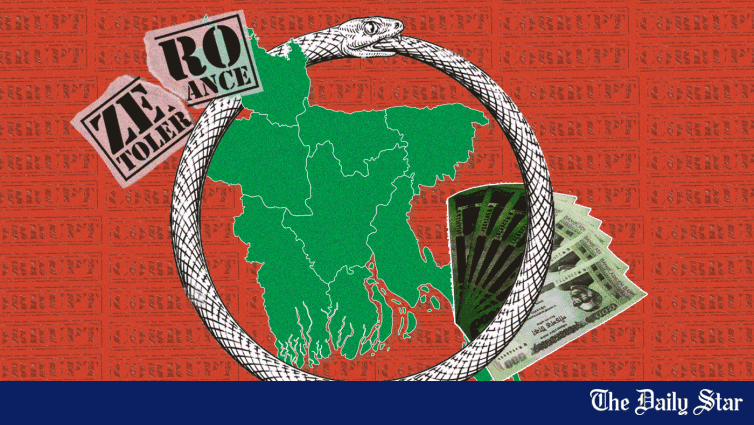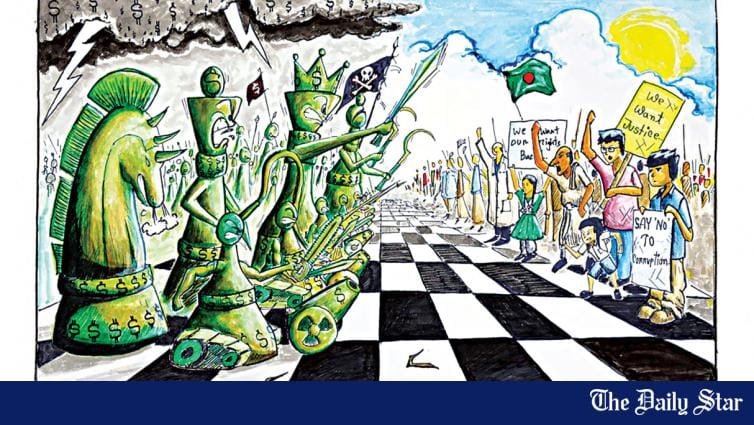Saif
Senior Member
- Messages
- 15,397
- Nation

- Axis Group


A corrupt taxman and his 'blessed' in-laws
Faisal, his relatives undervalued their properties in official documents, claims ACC
A corrupt taxman and his 'blessed' in-laws
Faisal, his relatives undervalued their properties in official documents, claims ACC

"When you rise, lift others [read in-laws in this case] with you"-- even if it means bending a few rules along the way.
Quazi Abu Mahmud Faisal, former first secretary of the National Board of Revenue (NBR), seems to have lived up to these words.
Faisal, who was recently transferred to the Bogura office of NBR, has been under the spotlight recently for allegedly amassing a staggering Tk 1,000 crore illegally, as claimed by the ACC.
But it's not just Faisal whose fortune has risen exponentially thanks to his government job; his in-laws too seem to have hit the jackpot.
Faisal has purchased a 2,990-square-foot flat in Siddheshwari and 10 katha of land in Meradia, Dhaka, in the names of Ahmed Ali, his father-in-law, and Momtaz Begum, his mother-in-law.
The values of these properties were strategically undervalued in official documents.
Although the Siddehshwari flat was purchased in the name of Ahmed Ali on paper, in reality, it's Faisal and his family who have been living there for a year, according to locals.
The flat, located on the 10th floor of one of the four buildings in Rupayan Swapno Niloy in Siddheshwari, was shown to be bought for Tk 95.50 lakh.
The market value of the 2,990-square-foot flat is Tk 1 crore, according to an ACC document submitted to the court.
The Daily Star has a draft copy of the document.
Bazlur Rahman, who has been living in the area over the past three decades, also finds the official valuation "unbelievable".
"It's a real miracle," Rahman said, adding that the per square foot price in Siddheshwari ranges from Tk 10,000-15,000, and the actual market value of Faisal's flat is at least Tk 3 crore.
Besides, at least Tk 25 lakh more is required for parking space, he added.
Meanwhile, Momtaz Begum's fortune turned bright in February 2022 when she acquired 10 kathas of land in Meradia for Tk 52 lakh.
ACC believes the actual market value of the property is Tk 4.5 crore.
Besides, Faisal's father-in-law purchased a flat for Tk 1 crore from Rupayan Housing Estate in the city's Ramna area.
These are just the tips of the iceberg. The story goes even deeper.
For example, Faisal and his 11 relatives conducted transactions worth crores through 87 accounts across 19 banks and one non-bank financial institution.
The largest volume of transactions, amounting to Tk 11.57 crore, was found in the account of his father-in-law, a retired bank officer, who has eight bank accounts.
Faisal's mother-in-law Momtaz Begum, a homemaker, has 10 bank accounts, and transactions amounting to Tk 7 crore were spotted in these accounts.
ACC is now investigating how Faisal's father-in-law acquired so much wealth.
But Faisal didn't forget his wife Jesmin. She owns five kathas of land in Boro Kathaldia Mouza in Bhatara area, "valued" at Tk 18.17 lakh.
However, during the investigation, the ACC found the market value of this land to be Tk 75 lakh.
Moreover, there is also land "worth" Tk 7.5 lakh in Purbachal New Town, but the ACC has not disclosed its true value yet.
As for Faisal himself, he owns approximately 15.5 kathas of land spread across five places in Dhaka and Narayanganj, which he valued at Tk 40.29 lakh.
However, the ACC's investigators have stated that these land values have been significantly undervalued.
Faisal and his wife had also bought a five-katha plot from the Jolshiri Housing Project in Khilgaon, while his wife bought another five-katha plot for Tk 75 lakh from East-West Development.
Faisal has six accounts, which had transactions amounting to Tk 5.21 crore. Jesmin, a homemaker, has five bank accounts where transactions worth Tk 2.25 crore took place.
The Dhaka Metropolitan Senior Special Judge's Court ordered the seizure of Faisal's assets, including plots, flats, and bank accounts, which include 19 bank accounts and 87 financial institution accounts held by 11 of his relatives.
The seized assets, both movable and immovable, are valued at approximately Tk 17 crore as shown in official documents by Faisal and his family members.
However, ACC officials claimed in court that those properties were undervalued and they amount to no less than Tk 20 crore.
Faisal also purchased savings certificates worth Tk 2.55 crore between June 2019 and November 2023 in his and his family's names.
The allegations against Faisal include taking bribes for transferring income tax officials, intimidating taxpayers, and other irregularities.
ACC decided to investigate Faisal last year.
Faisal joined NBR in 2005 as a BCS cadre in the post of assistant tax commissioner.
Faisal, his relatives undervalued their properties in official documents, claims ACC
"When you rise, lift others [read in-laws in this case] with you"-- even if it means bending a few rules along the way.
Quazi Abu Mahmud Faisal, former first secretary of the National Board of Revenue (NBR), seems to have lived up to these words.
Faisal, who was recently transferred to the Bogura office of NBR, has been under the spotlight recently for allegedly amassing a staggering Tk 1,000 crore illegally, as claimed by the ACC.
But it's not just Faisal whose fortune has risen exponentially thanks to his government job; his in-laws too seem to have hit the jackpot.
Faisal has purchased a 2,990-square-foot flat in Siddheshwari and 10 katha of land in Meradia, Dhaka, in the names of Ahmed Ali, his father-in-law, and Momtaz Begum, his mother-in-law.
The values of these properties were strategically undervalued in official documents.
Although the Siddehshwari flat was purchased in the name of Ahmed Ali on paper, in reality, it's Faisal and his family who have been living there for a year, according to locals.
The flat, located on the 10th floor of one of the four buildings in Rupayan Swapno Niloy in Siddheshwari, was shown to be bought for Tk 95.50 lakh.
The market value of the 2,990-square-foot flat is Tk 1 crore, according to an ACC document submitted to the court.
The Daily Star has a draft copy of the document.
Bazlur Rahman, who has been living in the area over the past three decades, also finds the official valuation "unbelievable".
"It's a real miracle," Rahman said, adding that the per square foot price in Siddheshwari ranges from Tk 10,000-15,000, and the actual market value of Faisal's flat is at least Tk 3 crore.
Besides, at least Tk 25 lakh more is required for parking space, he added.
Meanwhile, Momtaz Begum's fortune turned bright in February 2022 when she acquired 10 kathas of land in Meradia for Tk 52 lakh.
ACC believes the actual market value of the property is Tk 4.5 crore.
Besides, Faisal's father-in-law purchased a flat for Tk 1 crore from Rupayan Housing Estate in the city's Ramna area.
These are just the tips of the iceberg. The story goes even deeper.
For example, Faisal and his 11 relatives conducted transactions worth crores through 87 accounts across 19 banks and one non-bank financial institution.
The largest volume of transactions, amounting to Tk 11.57 crore, was found in the account of his father-in-law, a retired bank officer, who has eight bank accounts.
Faisal's mother-in-law Momtaz Begum, a homemaker, has 10 bank accounts, and transactions amounting to Tk 7 crore were spotted in these accounts.
ACC is now investigating how Faisal's father-in-law acquired so much wealth.
But Faisal didn't forget his wife Jesmin. She owns five kathas of land in Boro Kathaldia Mouza in Bhatara area, "valued" at Tk 18.17 lakh.
However, during the investigation, the ACC found the market value of this land to be Tk 75 lakh.
Moreover, there is also land "worth" Tk 7.5 lakh in Purbachal New Town, but the ACC has not disclosed its true value yet.
As for Faisal himself, he owns approximately 15.5 kathas of land spread across five places in Dhaka and Narayanganj, which he valued at Tk 40.29 lakh.
However, the ACC's investigators have stated that these land values have been significantly undervalued.
Faisal and his wife had also bought a five-katha plot from the Jolshiri Housing Project in Khilgaon, while his wife bought another five-katha plot for Tk 75 lakh from East-West Development.
Faisal has six accounts, which had transactions amounting to Tk 5.21 crore. Jesmin, a homemaker, has five bank accounts where transactions worth Tk 2.25 crore took place.
The Dhaka Metropolitan Senior Special Judge's Court ordered the seizure of Faisal's assets, including plots, flats, and bank accounts, which include 19 bank accounts and 87 financial institution accounts held by 11 of his relatives.
The seized assets, both movable and immovable, are valued at approximately Tk 17 crore as shown in official documents by Faisal and his family members.
However, ACC officials claimed in court that those properties were undervalued and they amount to no less than Tk 20 crore.
Faisal also purchased savings certificates worth Tk 2.55 crore between June 2019 and November 2023 in his and his family's names.
The allegations against Faisal include taking bribes for transferring income tax officials, intimidating taxpayers, and other irregularities.
ACC decided to investigate Faisal last year.
Faisal joined NBR in 2005 as a BCS cadre in the post of assistant tax commissioner.





